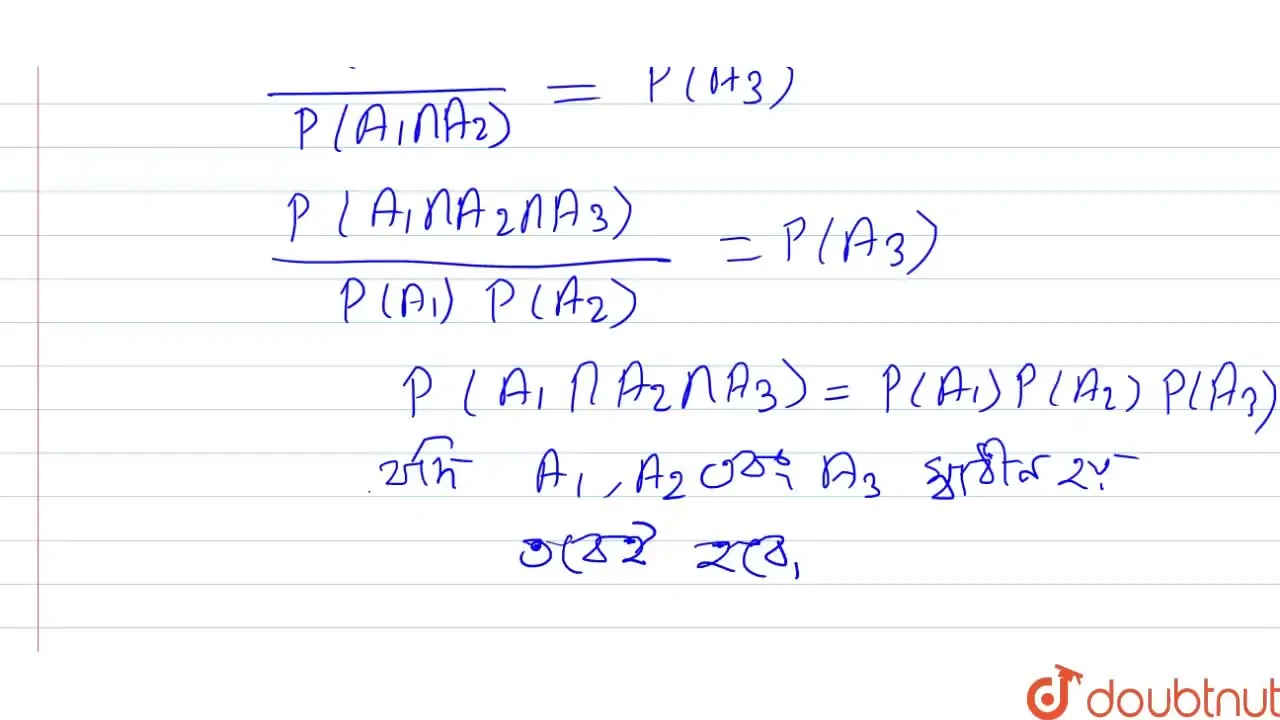A1,A2, ও A3, তিনটি ঘটনা। দেখাও যে, ঘটনা তিনটি একসঙ্গে ঘটার সম্ভাবনা হয়, P(A1∩A2∩A3)=P(A1)P(A2A1)P(A3A1∩A2) কোন্ শর্তাধীনে P(A1∩A2∩A3)=P(A1)P(A2)P(A3) হয় তাউল্লেখ করো।
Step by step video & image solution for A_1,A_2, ও A_3, তিনটি ঘটনা। দেখাও যে, ঘটনা তিনটি একসঙ্গে ঘটার সম্ভাবনা হয়, P(A_1nnA_2nnA_3)=P(A_1)P((A_2)/A_1)P((A_3)/(A_1nnA_2)) কোন্ শর্তাধীনে P(A_1nnA_2nnA_3)=P(A_1)P(A_2)P(A_3) হয় তাউল্লেখ করো। by Maths experts to help you in doubts & scoring excellent marks in Class 12 exams.
Related Playlists
Similar Questions
প্রদত্ত বিবৃতিগুলির কোনটি সত্য?
02:35View Solutionদুটি ঘটনাA ও B-এর জন্য দেওয়া আছে,P(A)=37, P(B)=47এবং P(A+B)=79 ,P(AB) ও P(BA)নির্ণয় করো। A ও B ঘটনা দুটি কি স্বাধীন?
04:52View Solutionসঠিক উত্তরটি নির্বাচন করো
limx→0e3x−12x -এর মান হবে -03:09View SolutionEvaluate: △∣∣ ∣∣1+a1a2a3a11+a2a3a1a21+a3∣∣ ∣∣
04:33View SolutionIf p(x),q(x)andr(x) be polynomials of degree one and a1,a2,a3 be real numbers then ∣∣ ∣ ∣∣p(a1)p(a2)p(a3)q(a1)q(a2)q(a3)r(a1)r(a2)r(a3)∣∣ ∣ ∣∣= (A) 0 (B) 1 (C) -1 (D) none of these
04:40View SolutionIf a2a3a1a4=a2+a3a1+a4=3(a2−a3a1−a4) then a1,a2,a3,a4 are in :
02:20View Solutionमाना a1,a2,a3…..एक समान्तर श्रेणी के पद है यदि a1+a2+….+apa1+a2+…..+aq=p2q2,p≠qतब a6a21 बराबर है
03:38View SolutionConsider an A.P.a1,a2,a3,..... such that a3+a5+a8=11anda4+a2=−2 then the value of a1+a6+a7 is.....
03:57View SolutionIf P(A1)=0.2, P(A2)=0.1 and P(A3)=0.3 and these events are mutually independent, then what is the value of P(A1∩A2∩A3)?
02:06View SolutionFor any two events A1 and A2, prove that P(A1∩A2)≤min{PA1),P(A2)} where min{PA1),P(A2)} is the minimum of P(A1) and P(A2).
02:36View SolutionShow that P(B)>0, then P(A1∪A2∣B)=P(A1∣B)+P(A2∣B)−P(A1∩A2∣B).
02:35View SolutionFor any two events A1 and A2, show that P(A1∩A2)≤min{P(A1),P(A2)} where min{P(A1),P(A2)} is the minimum of P(A1) and P(A2).
06:45View SolutionIf A1, A2, A3 are mutually exclusive and exhaustive, then P(A1)+P(A2)+P(A3) equal______
02:36View SolutionProve that, if A1 and A2 are two events, which are not necessarily mutually exclusive then P(A1∪A2)=P(A1)+P(A1∩A2)
07:22View SolutionLet a1,a2,a3,.... be terms of an A.P. if a1+a2+....+apa1+a2+...+aq=p2q2.p≠q then a6a21 equals
05:43View Solution


